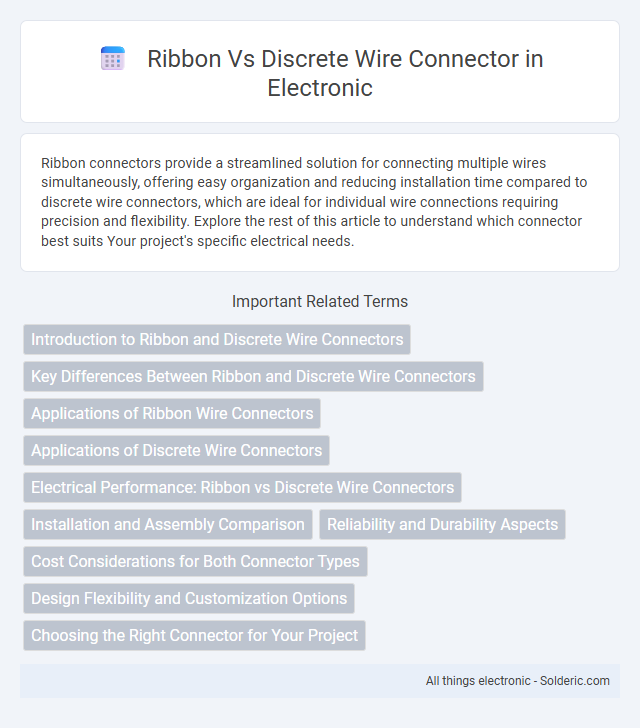Ribbon connectors provide a streamlined solution for connecting multiple wires simultaneously, offering easy organization and reducing installation time compared to discrete wire connectors, which are ideal for individual wire connections requiring precision and flexibility. Explore the rest of this article to understand which connector best suits Your project's specific electrical needs.
Comparison Table
| Feature | Ribbon Connector | Discrete Wire Connector |
|---|---|---|
| Design | Flat, ribbon-like conductors bundled together | Individual, separately insulated wires |
| Application | Used for parallel data transfer, computer cables | Used for point-to-point electrical connections |
| Installation | Easy to connect multiple pins at once | Requires individual connections for each wire |
| Flexibility | Less flexible, prone to bending limits | More flexible, adaptable to complex routing |
| Space Efficiency | Saves space by organizing wires flat | Can be bulkier due to individual wires |
| Durability | Less durable under frequent flexing | More durable with proper insulation |
| Cost | Generally lower due to bulk manufacturing | Potentially higher due to labor and materials |
Introduction to Ribbon and Discrete Wire Connectors
Ribbon wire connectors simplify the organization and connection of multiple conductors simultaneously by using flat, parallel wires bundled in a ribbon-like structure. Discrete wire connectors, on the other hand, handle individual wires separately, offering targeted electrical connections for single conductors with insulation displacement. Your choice between ribbon and discrete wire connectors depends on application requirements such as space, wiring complexity, and ease of installation.
Key Differences Between Ribbon and Discrete Wire Connectors
Ribbon wire connectors organize multiple conductors in a flat, ribbon-like arrangement, enabling efficient mass termination and streamlined wiring in compact spaces. Discrete wire connectors handle individual wires separately, offering greater flexibility for wiring configurations and ease of troubleshooting in complex circuits. The choice between ribbon and discrete connectors hinges on application requirements such as installation speed, space constraints, and circuit complexity.
Applications of Ribbon Wire Connectors
Ribbon wire connectors are ideal for applications requiring quick, organized connections across multiple conductors, such as in automotive wiring harnesses, telecommunications, and industrial control panels. Their design enables efficient mass termination, reducing installation time and ensuring consistent spacing and alignment of wires. Your projects benefit from improved reliability and streamlined assembly when using ribbon wire connectors in environments demanding dense, uniform wiring configurations.
Applications of Discrete Wire Connectors
Discrete wire connectors are widely used in residential, commercial, and industrial electrical applications where individual wire termination is required. They provide secure connections for lighting fixtures, appliances, and control systems, ensuring reliable electrical continuity and safety. You can rely on discrete wire connectors for easy maintenance and replacement in complex wiring environments.
Electrical Performance: Ribbon vs Discrete Wire Connectors
Ribbon wire connectors provide superior electrical performance due to their uniform contact pressure and reduced contact resistance, ensuring consistent current flow across multiple conductors. Discrete wire connectors, while versatile, often introduce higher contact resistance and potential signal degradation at each individual connection point. The continuous conductive surface of ribbon connectors enhances conductivity and minimizes power loss, making them ideal for high-performance electrical applications.
Installation and Assembly Comparison
Ribbon wire connectors enable quicker installation due to their flat design, allowing multiple wires to be connected simultaneously with a single crimp or splice. Discrete wire connectors require individual connections, increasing assembly time and complexity for multi-wire setups. The streamlined process of ribbon connectors reduces labor costs and enhances consistency in high-volume production environments.
Reliability and Durability Aspects
Ribbon wire connectors exhibit superior reliability due to their consistent contact pressure and reduced risk of loosening, ensuring stable electrical connections in harsh environments. Discrete wire connectors, while versatile, may suffer from intermittent connectivity issues caused by mechanical vibration or corrosion over time. Material composition and design intricacies significantly influence the durability of both connector types, with ribbon connectors often utilizing high-quality alloys to enhance longevity in demanding industrial applications.
Cost Considerations for Both Connector Types
Ribbon wire connectors generally offer lower material and installation costs due to their streamlined design and ease of use in mass production. Discrete wire connectors may incur higher expenses because of individual wire handling, increased labor time, and potentially more complex assembly processes. Selecting between ribbon and discrete connectors involves balancing upfront connector costs against long-term efficiency and application-specific requirements.
Design Flexibility and Customization Options
Ribbon wire connectors offer enhanced design flexibility through their ability to handle multiple conductors simultaneously, simplifying complex wiring layouts and reducing assembly time. Discrete wire connectors provide high customization options tailored to individual wire sizes and configurations, allowing for precise connections in specialized applications. Both types support various insulation materials and terminal designs, but ribbon connectors excel in streamlined mass termination while discrete connectors dominate in bespoke, single-wire connections.
Choosing the Right Connector for Your Project
Choosing the right connector for your project depends on factors like current capacity, ease of installation, and space constraints. Ribbon connectors offer a compact and organized solution for low to moderate current applications, while discrete wire connectors provide superior flexibility and reliability for higher current loads and more complex wiring setups. Evaluate your specific electrical requirements and environmental conditions to determine whether a ribbon or discrete wire connector best supports your project's performance and safety goals.
Ribbon vs Discrete wire connector Infographic

 solderic.com
solderic.com